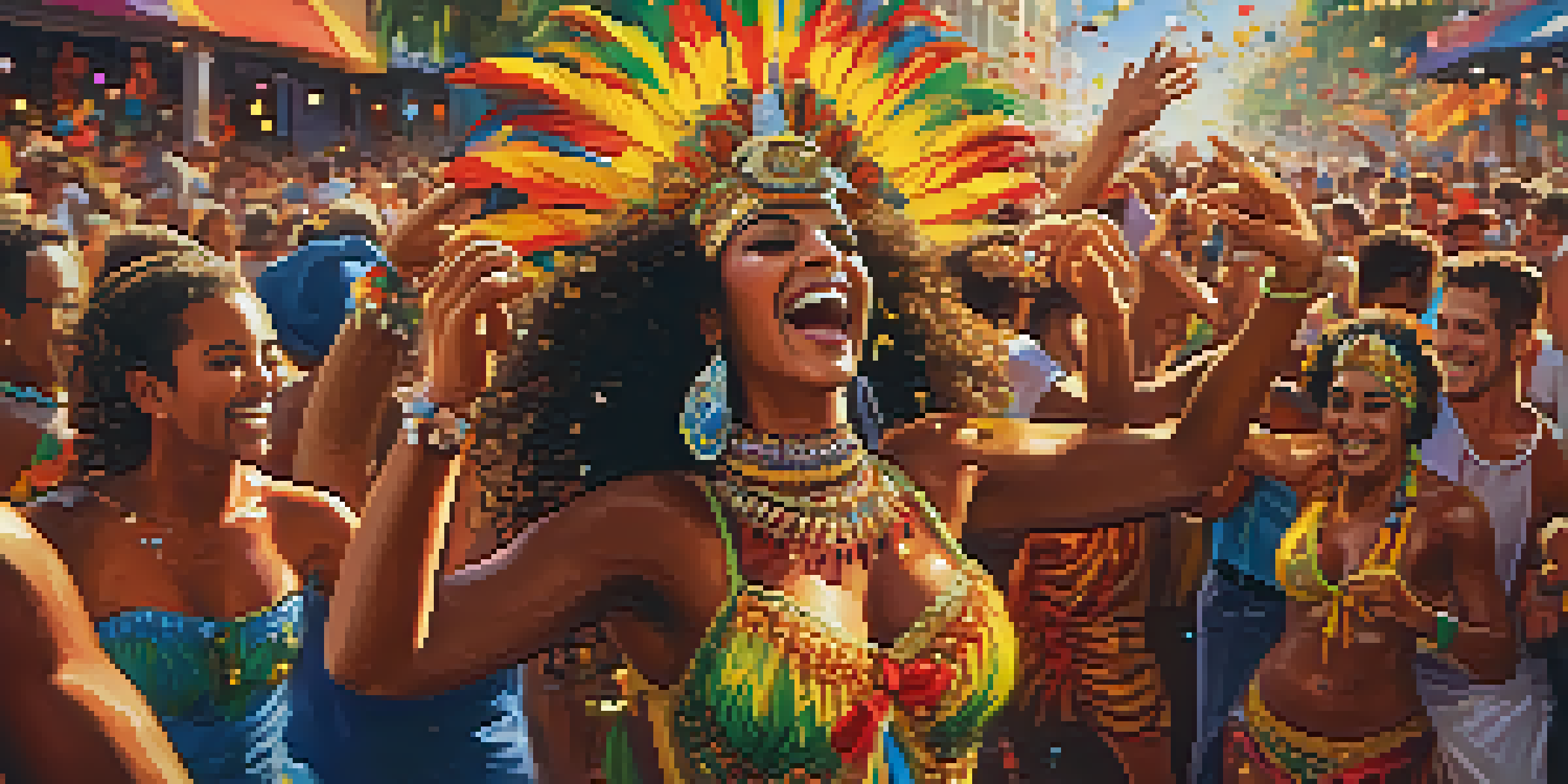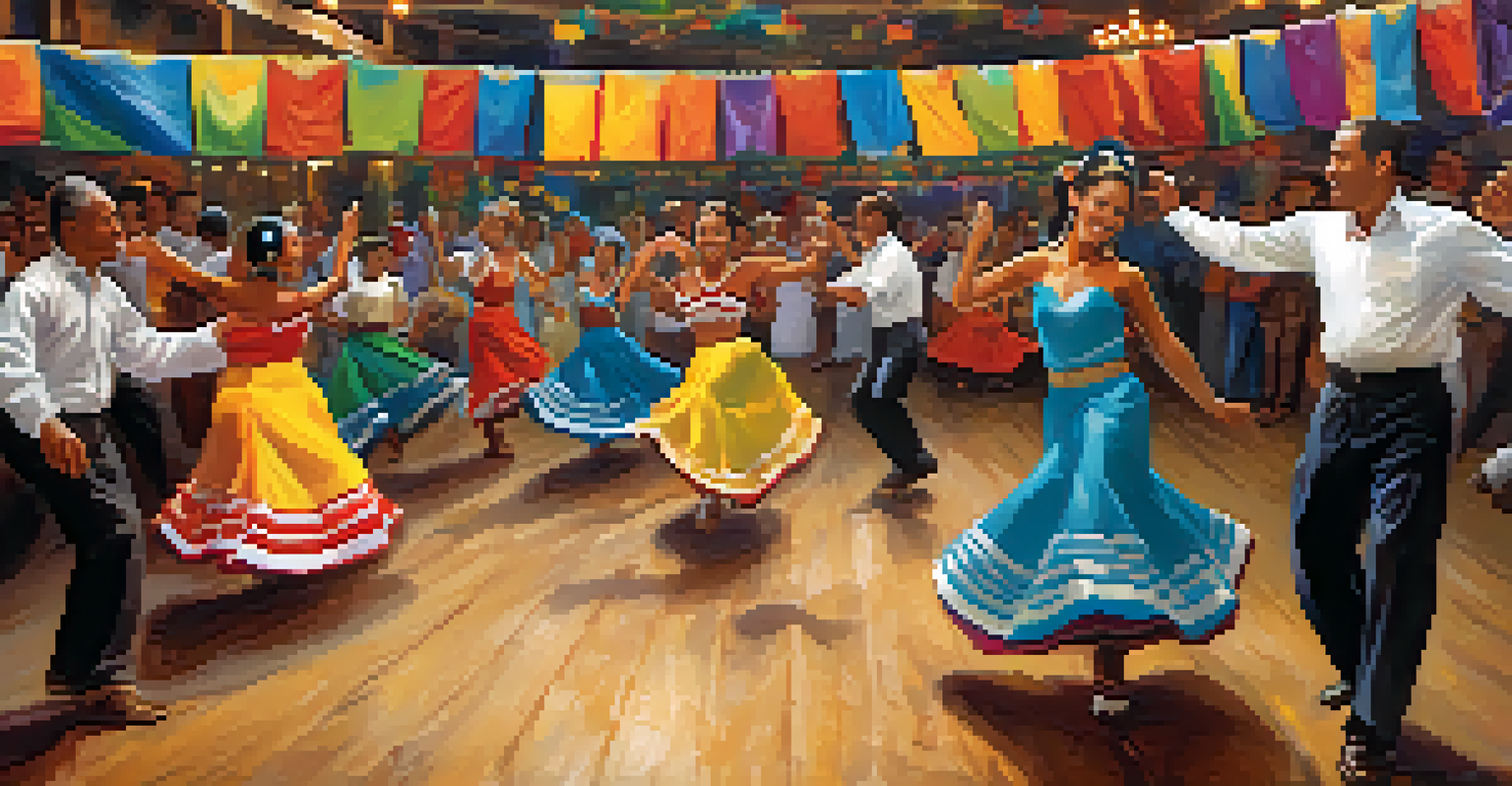Discover Brazil's Rich Musical Heritage Through Cultural Tours

The Heartbeat of Brazil: An Introduction to Its Music
Brazil's music is a vibrant tapestry woven from various cultural influences, reflecting the country's diverse heritage. From samba and bossa nova to forró and MPB (Música Popular Brasileira), each genre tells a unique story. This rich musical landscape is not just entertainment; it's a form of cultural expression deeply rooted in the nation's history and social fabric.
Music is the shorthand of emotion.
Understanding Brazil's musical heritage begins with recognizing its origins, which range from Indigenous sounds to African rhythms brought by enslaved peoples. These influences merged over centuries, creating a dynamic musical scene that evolves while honoring its roots. Exploring this heritage through cultural tours allows travelers to connect with the rhythms that pulse through Brazilian life.
Cultural tours offer an immersive experience where you can witness live performances, visit iconic music venues, and participate in local festivals. This hands-on approach not only enriches your understanding of Brazilian music but also creates lasting memories that resonate long after the trip ends.
Samba: The Soul of Brazil's Musical Identity
Samba is often considered the heartbeat of Brazilian music, originating from Afro-Brazilian communities in Rio de Janeiro. Its infectious rhythms and lively dance have made it synonymous with Brazil’s cultural identity, especially during the famous Carnaval celebrations. This genre embodies joy, resilience, and a sense of community, inviting everyone to join the dance.

Cultural tours centered around samba can take you to dance schools, where you can learn the basic steps and feel the rhythm firsthand. You might even get the chance to participate in a samba circle, surrounded by locals who share their passion for this lively art form. Experiencing samba in its native setting enhances your appreciation for its history and significance.
Brazil's Music: A Cultural Mosaic
Brazil's diverse musical genres, from samba to bossa nova, reflect the country's rich cultural heritage and history.
Moreover, attending a samba show or visiting a samba school during Carnaval season immerses you in the vibrant energy that defines this genre. You’ll witness how samba brings people together, transcending language barriers and showcasing the spirit of Brazil through music and dance.
Bossa Nova: The Smooth Sounds of Brazil's Elegance
Bossa nova emerged in the late 1950s, blending samba with jazz influences to create a more laid-back, sophisticated sound. This genre gained international acclaim through artists like João Gilberto and Tom Jobim, whose melodies evoke feelings of nostalgia and romance. Bossa nova's smooth rhythms make it a favorite in cafés and bars, offering a perfect backdrop for relaxation.
Where words fail, music speaks.
Cultural tours focusing on bossa nova often include visits to iconic locations in Rio, such as the picturesque Ipanema beach. Here, you can enjoy live performances while sipping a caipirinha, Brazil's famous cocktail. Experiencing bossa nova in its natural habitat allows you to appreciate its artistry and the beautiful landscapes that inspired many songs.
Additionally, workshops where you can learn to play bossa nova on guitar or piano provide a deeper connection to the music. These intimate settings allow for personal interaction with local musicians, who can share stories and techniques that bring the genre to life in a way that recordings simply cannot.
Forró: A Dance of Passion and Tradition
Forró, a lively dance and music genre from Northeastern Brazil, is characterized by its upbeat tempo and romantic lyrics. With roots in traditional folk music, forró combines elements from various cultures, including Portuguese, Indigenous, and African influences. It's a celebration of love, community, and resilience, often seen at local festas and community gatherings.
Participating in a forró cultural tour can lead you to local dance halls where you can learn the energetic steps surrounded by enthusiastic dancers. These events are not just about learning to dance; they foster a sense of belonging and connection with the local community. Everyone is welcome, regardless of skill level, making it a joyful experience.
Immersive Cultural Tours Enhance Experience
Participating in cultural tours provides a hands-on understanding of Brazil's music, fostering connections with local communities and traditions.
Moreover, attending a forró festival provides insight into the cultural importance of this genre. You'll experience vibrant costumes, delicious regional food, and the warm hospitality of the Brazilians who cherish their traditions. This immersive experience highlights the role of music and dance as vital expressions of identity in Brazilian culture.
The Role of Music in Brazilian Festivals
Brazil is renowned for its lively festivals, where music plays a central role in celebrations. Events like Carnaval, Festa Junina, and the Parintins Folklore Festival showcase the country's diverse musical heritage, bringing together communities to celebrate their culture. These festivals offer a unique opportunity to experience the power of music as a unifying force.
Cultural tours during festival seasons allow visitors to witness spectacular parades, dance performances, and live concerts. Festivals transform cities into vibrant stages where traditional music and contemporary sounds merge, creating an electrifying atmosphere. Engaging with locals during these events enhances your understanding of how music shapes Brazilian identity and community spirit.
Participating in workshops or classes during festivals can deepen your appreciation for the music and dance forms on display. Whether learning to play an instrument or joining a dance group, these experiences provide a personal connection to the cultural expressions that make Brazil so unique.
Exploring Regional Variations in Brazilian Music
Brazil's vast geography contributes to the rich variety of musical styles found across the country. Each region has its unique sound and cultural influences, from the rhythms of samba in Rio to the folk melodies of the Amazon. Understanding these regional variations provides a more comprehensive view of Brazil's musical heritage and its cultural significance.
Cultural tours designed to showcase regional music often include visits to local artists' studios or community gatherings. Here, you can experience firsthand the distinct instruments, rhythms, and styles that define each area's sound. Engaging with local musicians allows for a deeper appreciation of the cultural context behind the music.
Preserving Musical Heritage is Key
Efforts to preserve Brazil's unique musical heritage are crucial for maintaining cultural identity amidst globalization.
From the maracatu of Pernambuco to the axé of Bahia, each region's music tells a story of its people and history. These tours encourage exploration and celebration of diversity, highlighting how music serves as a bridge connecting different cultures within Brazil.
Preserving Brazil's Musical Heritage for Future Generations
As globalization influences music worldwide, preserving Brazil's unique musical heritage becomes increasingly important. Cultural institutions, local artists, and community organizations are working tirelessly to ensure that traditional forms of music are passed down to future generations. This commitment to preservation reflects a deep respect for cultural identity and history.
Cultural tours that focus on preservation often include visits to museums and cultural centers dedicated to Brazilian music. Here, you can learn about the history of various musical genres and the efforts being made to sustain them. These experiences emphasize the importance of music as a living art form that evolves while staying true to its roots.

Moreover, participating in these tours supports local economies and encourages appreciation for traditional music. By engaging with the community and its cultural heritage, travelers contribute to the ongoing narrative of Brazil's music, helping to ensure that its rich traditions continue to thrive.